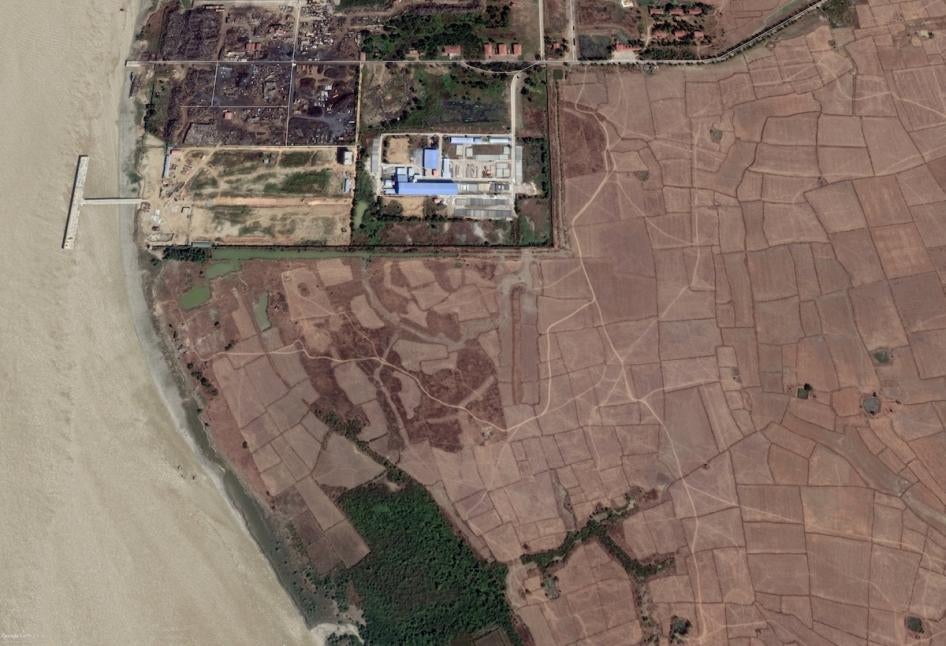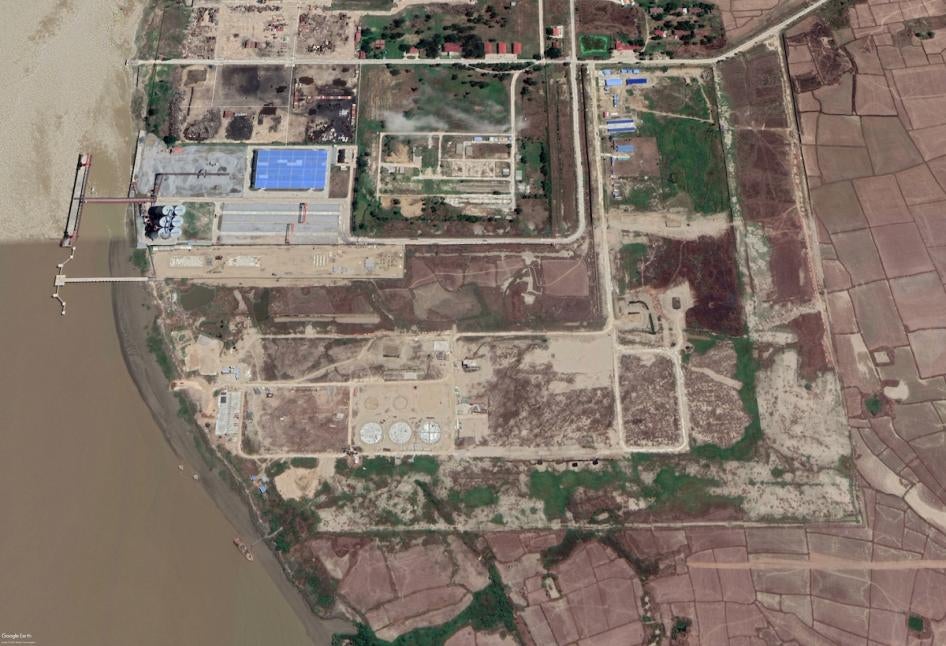Thailand‘s majority state-owned oil and gas company, PTT, is partnering with military-linked companies to expand its engagement in Myanmar, Human Rights Watch said today. This growth comes on top of the half a billion dollars PTT already pays annually to junta-controlled enterprises through its existing operations in Myanmar’s gas fields.
A 2019 PTT joint venture is paying the military conglomerate Myanmar Economic Corporation (MEC) nearly US$1 million in annual rent for the construction of a fuel terminal on land seized from farmers. The United States, United Kingdom, European Union, and Canada have sanctioned MEC and the other military conglomerate, Myanmar Economic Holdings Limited (MEHL), for their role in generating vast revenues that help fund the military’s abuses and enshrine its impunity.
PTT should end ties with Myanmar’s military enterprises and suspend all new investment in the country until a democratic government is established. Foreign governments should also adopt measures to block direct or indirect payments to the State Administration Council (SAC) junta from oil and gas projects operated by PTT and other companies.
“By expanding business ties with the Myanmar military as it carries out a bloody crackdown, the Thai state-owned PTT has shown little regard for the lives and freedom of Myanmar’s people,” said Shayna Bauchner, Asia researcher. “PTT’s leadership should respect international sanctions and cut ties with the junta to avoid being complicit in its crimes.”
Since the February 1, 2021 coup that overthrew the duly elected government, Myanmar’s military has responded with increasing brutality to nationwide pro-democracy protests. State security forces have killed over 820 people and detained an estimated 4,300 activists, journalists, civil servants, and politicians.
PTT has conducted oil and gas exploration and production in Myanmar since 1989, paying Myanmar state-controlled entities billions of dollars for gas in fees, taxes, royalties, and revenues. But with production declining in recent years, the company has ramped up its midstream and downstream investments in the country, with the stated goal of becoming the “top Myanmar provider” of petroleum products. Human Rights Watch wrote PTT on May 11, inquiring about the company’s operations in Myanmar, but received no response.
The Indian company Adani Ports and Special Economic Zone was recently removed from the Dow Jones Sustainability Indices due to “heightened risks to the company regarding their commercial relationship with Myanmar’s military.” Like PTT, the company had acquired land from MEC. PTT and four subsidiaries are listed on the same sustainability index. Human Rights Watch contacted S&P Dow Jones Indices requesting that they review PTT according to the same standard as Adani.
PTT’s plans for growth are outlined in part in a March 2017 memorandum of understanding, recently leaked by transparency collective DDoSecrets, with the military-aligned Kanbawza Group (KBZ). The company later announced plans to invest over $200 million in its partnership with KBZ.
In 2019, PTT Oil and Retail (PTTOR, a PTT subsidiary) and KBZ began a joint venture to build a jetty, fuel oil storage terminal, and liquefied petroleum gas (LPG) filling plant in the Thilawa area of Kyauktan township, Yangon Region, with a stated investment of $150 million. The terminal will be largest in the country, according to PTT, with a reported capacity of one million barrels of oil and 4,500 metric tons of LPG. It was originally slated for completion in 2021.
KBZ, a major Myanmar conglomerate owned by a longtime military crony, Aung Ko Win, runs the country’s largest bank and dozens of companies across mining, manufacturing, technology, trade, and other industries. KBZ maintains close personal, financial, and commercial ties to the military that benefit and enable the security forces. In 2019, the United Nations-backed Independent International Fact-Finding Mission on Myanmar found that KBZ donated US$4.7 million to the 2017 security force operations against the ethnic Rohingya in Rakhine State, and concluded that KBZ officials should be investigated and prosecuted as appropriate for having “aided, abetted, or otherwise assisted in the crimes against humanity of persecution and other inhumane acts.”
KBZ has also partnered with the military-conglomerate MEHL for over two decades in jade and gems mining ventures. The EU sanctioned Kanbawza Bank, Aung Ko Win, and his family members until 2012 for their engagement with the prior military junta. Human Rights Watch wrote KBZ on May 11 but received no response.
To develop the fuel terminal, the PTTOR and KBZ joint venture, Brighter Energy, is leasing land from MEC and the Ministry of Defense under a build-operate-transfer (BOT) agreement, according to leaked Myanmar Investment Commission documents. PTT bought a 35 percent stake in Brighter Energy from KBZ in 2019.
The BOT agreement covers 168.5 acres of land owned by MEC near its shipbreaking factory in Thilawa and is valid for 50 years following a two-year construction period, with the option to renew for two additional 10-year terms. Lease payments to MEC include a $1,685,000 land use premium fee and $808,800 annual rent, for a total of $42 million over the contract period. All fuel terminal structures and fixtures are to be transferred to MEC at no cost when the lease ends. The agreement is signed by Thant Swe, MEC managing director, who was recently sanctioned by the UK, and Brighter Energy directors.
The authorities acquired the land in Kyauktan’s Thida Myaing ward by seizing it from farmers who had worked there for decades, nongovernmental organizations EarthRights International and Namati reported. In 2014, MEC filed a criminal trespass complaint against 33 farmers based on a 1996 illegal confiscation attempt by military government officials. The farmers were found guilty in 2018. That year, MEC filed land record forms of the area in an application to use 168.5 acres for “buildings and storage tanks.”


February 2017: © 2021 Maxar Technologies; Source: Google Earth May 2020: © 2021 Maxar Technologies; Source: Google Earth
PTT and KBZ will also pay a significant amount in taxes to the junta-controlled Internal Revenue Department. In an annex to the contract, the combined commercial and income tax over the first 20 years is estimated at $1.36 billion. Brighter Energy lists the terminal’s estimated net profit as $65.7 million in the first year of operation and $104 million annually after 10 years, with an additional $63 million per year from oil and gas sales.
The fuel terminal project is just one example of PTT’s planned expansion in Myanmar. In December 2020, PTT signed an agreement to invest $2 billion in a new gas-to-power project for domestic use with the Ministry of Electricity and Energy, now led by SAC Minister Aung Than Oo, who was sanctioned by the EU for his role in the previous military junta. A PTT executive, Phongsthorn Thavisin, told reporters in March that the project was not affected by the coup and would move ahead, saying the company was politically neutral. PTT sought tenders in May for a drilling rig in the project location.
PTT already pays Myanmar over $500 million a year through its projects with the Myanmar Oil and Gas Enterprise (MOGE) in three of the country’s four major gas fields. The company reported paying $125 million in taxes in 2019 to the Ministry of Planning, Finance, and Industry, now led by SAC Minister Win Shein, who was also previously sanctioned by the EU for his role as a deputy minister under the prior junta.
PTT’s human rights standards state that the company is guided by international human rights treaties and other internationally accepted standards on human rights applicable to companies, including the UN Guiding Principles on Business and Human Rights.
Since the coup, the State Administration Council has seized control of all government ministries and state-owned enterprises – as well as their bank accounts – including those involved in PTT’s projects. The junta has also overhauled the Myanmar Investment Commission, responsible for facilitating all foreign investment, installing as chair Lt. Gen. Moe Myint Tun, also a member of the junta. The US, UK, EU, and Canada have sanctioned Moe Myint Tun for committing serious human rights violations, both as a member of SAC and in his previous role as army chief of staff overseeing operations against the Rohingya in 2017. As with other military leaders, Moe Myint Tun is a director of both MEC and MEHL.
Foreign governments should block payments to the junta and state-owned enterprises from foreign-financed oil and gas projects, such as those operated by PTT, Total, and Chevron. Such measures can be designed to target the junta’s access to foreign accounts while allowing for the continued production of gas and electricity.
Thai financial authorities should cooperate with governments that have imposed sanctions and instruct Thai banks processing foreign currency transactions to comply with other countries’ economic measures and sanctions.
Governments that have sanctioned MEC and MEHL should encourage Thailand, Japan, Singapore, and other countries with significant investment in Myanmar to adopt similar measures.
“PTT’s investments in Myanmar provide hundreds of millions of dollars to the military,” Bauchner said. “Concerned governments should zero in on these sources of funds as a prime target for sanctions to make it much harder for coup leader Min Aung Hlaing, the junta, and other generals to benefit from their atrocities.”
